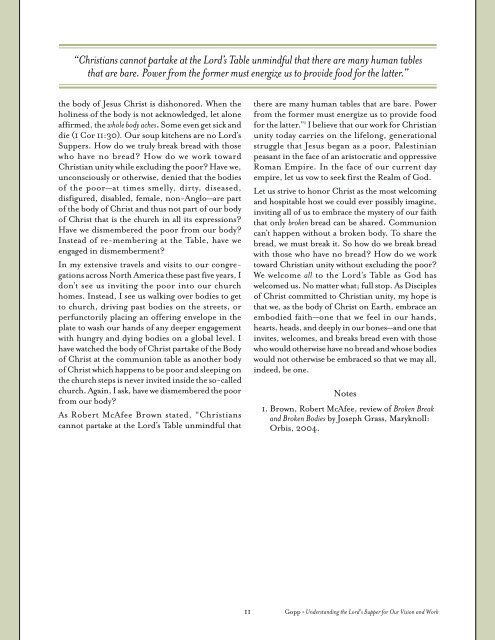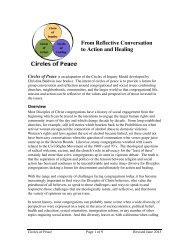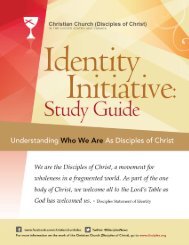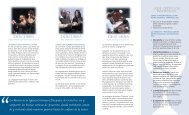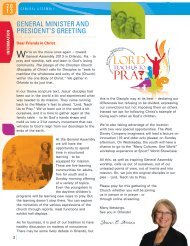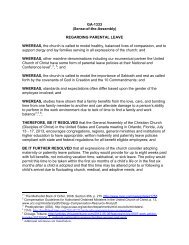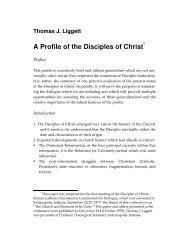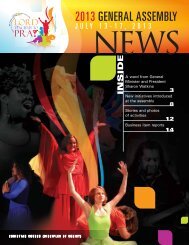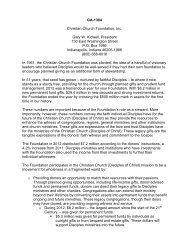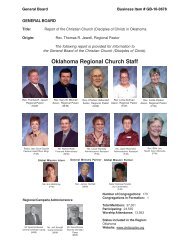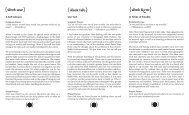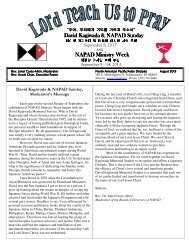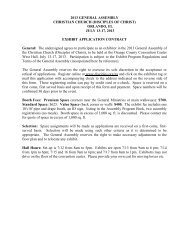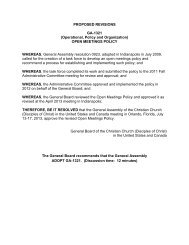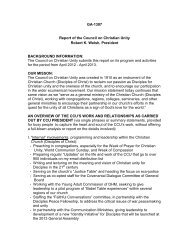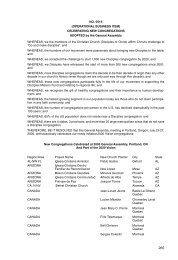RESOURCING THE CHURCH FOR ECUMENICAL MINISTRy A ...
RESOURCING THE CHURCH FOR ECUMENICAL MINISTRy A ...
RESOURCING THE CHURCH FOR ECUMENICAL MINISTRy A ...
You also want an ePaper? Increase the reach of your titles
YUMPU automatically turns print PDFs into web optimized ePapers that Google loves.
“Christians cannot partake at the Lord’s Table unmindful that there are many human tables<br />
that are bare. Power from the former must energize us to provide food for the latter.”<br />
the body of Jesus Christ is dishonored. When the<br />
holiness of the body is not acknowledged, let alone<br />
affirmed, the whole body aches. Some even get sick and<br />
die (1 Cor 11:30). Our soup kitchens are no Lord’s<br />
Suppers. How do we truly break bread with those<br />
who have no bread? How do we work toward<br />
Christian unity while excluding the poor? Have we,<br />
unconsciously or otherwise, denied that the bodies<br />
of the poor—at times smelly, dirty, diseased,<br />
disfigured, disabled, female, non-Anglo—are part<br />
of the body of Christ and thus not part of our body<br />
of Christ that is the church in all its expressions?<br />
Have we dismembered the poor from our body?<br />
Instead of re-membering at the Table, have we<br />
engaged in dismemberment?<br />
In my extensive travels and visits to our congregations<br />
across North America these past five years, I<br />
don’t see us inviting the poor into our church<br />
homes. Instead, I see us walking over bodies to get<br />
to church, driving past bodies on the streets, or<br />
perfunctorily placing an offering envelope in the<br />
plate to wash our hands of any deeper engagement<br />
with hungry and dying bodies on a global level. I<br />
have watched the body of Christ partake of the Body<br />
of Christ at the communion table as another body<br />
of Christ which happens to be poor and sleeping on<br />
the church steps is never invited inside the so-called<br />
church. Again, I ask, have we dismembered the poor<br />
from our body?<br />
As Robert McAfee Brown stated, “Christians<br />
cannot partake at the Lord’s Table unmindful that<br />
11<br />
there are many human tables that are bare. Power<br />
from the former must energize us to provide food<br />
for the latter.” 1 I believe that our work for Christian<br />
unity today carries on the lifelong, generational<br />
struggle that Jesus began as a poor, Palestinian<br />
peasant in the face of an aristocratic and oppressive<br />
Roman Empire. In the face of our current day<br />
empire, let us vow to seek first the Realm of God.<br />
Let us strive to honor Christ as the most welcoming<br />
and hospitable host we could ever possibly imagine,<br />
inviting all of us to embrace the mystery of our faith<br />
that only broken bread can be shared. Communion<br />
can’t happen without a broken body. To share the<br />
bread, we must break it. So how do we break bread<br />
with those who have no bread? How do we work<br />
toward Christian unity without excluding the poor?<br />
We welcome all to the Lord’s Table as God has<br />
welcomed us. No matter what; full stop. As Disciples<br />
of Christ committed to Christian unity, my hope is<br />
that we, as the body of Christ on Earth, embrace an<br />
embodied faith—one that we feel in our hands,<br />
hearts, heads, and deeply in our bones—and one that<br />
invites, welcomes, and breaks bread even with those<br />
who would otherwise have no bread and whose bodies<br />
would not otherwise be embraced so that we may all,<br />
indeed, be one.<br />
Notes<br />
1. Brown, Robert McAfee, review of Broken Break<br />
and Broken Bodies by Joseph Grass, Maryknoll:<br />
Orbis, 2004.<br />
Gopp • Understanding the Lord’s Supper for Our Vision and Work


